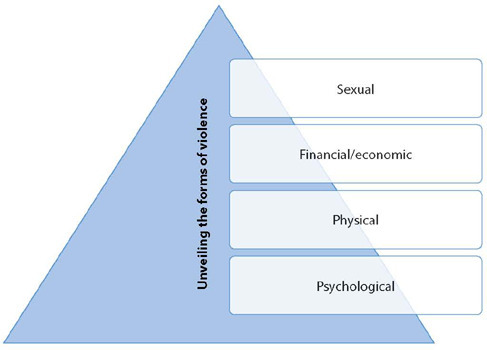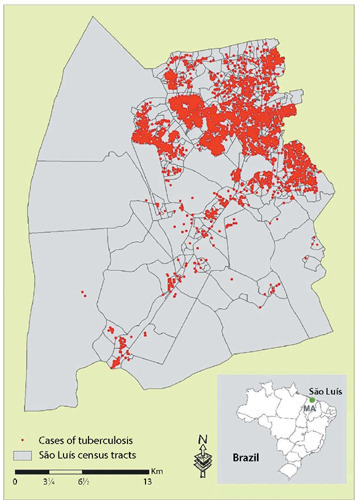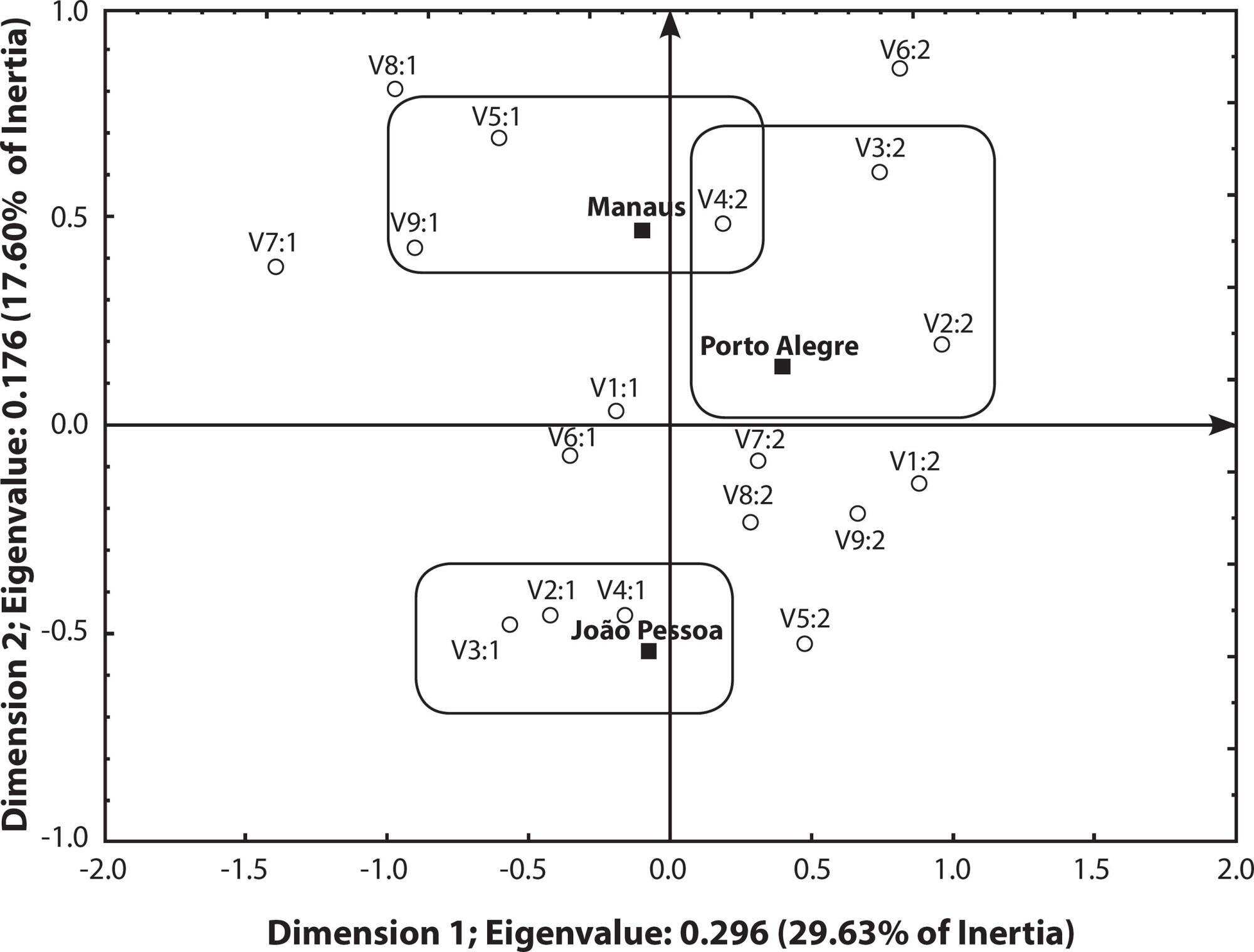-
ORIGINAL ARTICLE06-28-2024
Quality of life at work for health professionals during the COVID-19 pandemic
Revista Brasileira de Enfermagem. 2024;77:e20230461
Abstract
ORIGINAL ARTICLEQuality of life at work for health professionals during the COVID-19 pandemic
Revista Brasileira de Enfermagem. 2024;77:e20230461
DOI 10.1590/0034-7167-2023-0461
Views0See moreABSTRACT
Objective:
to evaluate the quality of life at work of health professionals in direct and indirect care of COVID-19 cases.
Methods:
this was a cross-sectional study with 156 health professionals from a referral hospital. The relationship between sociodemographic and work-related variables and perceived stress and domains of the Quality of Life at Work Scale was investigated using inferential statistics and regression.
Results:
Satisfaction with Compassion was moderate (mean: 38.2), with low perception of stress, Burnout and Secondary Traumatic Stress (means: 18.8, 21.6 and 19.1). There were associations between: education, salary, multiple jobs and direct care with Compassion Satisfaction; low income, being a nurse and working overtime with Burnout; and working more than 12 hours, underlying disease and hospitalization for COVID-19 with Secondary Traumatic Stress.
Conclusion:
quality of life at work was satisfactory, despite the presence of Burnout and Secondary Traumatic Stress.
-
ORIGINAL ARTICLE06-28-2024
Nursing leadership strategies in addressing COVID-19 in light of John Kotter’s framework
Revista Brasileira de Enfermagem. 2024;77:e20230289
Abstract
ORIGINAL ARTICLENursing leadership strategies in addressing COVID-19 in light of John Kotter’s framework
Revista Brasileira de Enfermagem. 2024;77:e20230289
DOI 10.1590/0034-7167-2023-0289
Views0See moreABSTRACT
Objective:
To analyze the leadership strategies of nurses in university hospitals in response to care management changes during the COVID-19 pandemic, informed by John Kotter’s insights.
Methods:
This multicentric study utilized qualitative and analytical methods. It was conducted through semi-structured interviews with 139 lead nurses from 10 university hospitals in Brazil. Data analysis included Bardin’s content analysis and the webQDA software.
Results:
The primary category identified was “Nursing Leadership Strategies in the Battle Against COVID-19,” encompassing five subcategories. This category underscored the importance of strategic vision in nursing leadership for combating COVID-19 within hospital settings, as well as the necessity of working collaboratively with their teams and other healthcare professionals.
Final Considerations:
The results highlight the strategies used by lead nurses in confronting COVID-19, which can be associated with John Kotter’s theoretical framework and his model of change.
-
ORIGINAL ARTICLE06-28-2024
Quality of Care Transition for COVID-19 Patients in a University Hospital in Southern Brazil
Revista Brasileira de Enfermagem. 2024;77:e20230402
Abstract
ORIGINAL ARTICLEQuality of Care Transition for COVID-19 Patients in a University Hospital in Southern Brazil
Revista Brasileira de Enfermagem. 2024;77:e20230402
DOI 10.1590/0034-7167-2023-0402
Views0See moreABSTRACT
Objective:
To assess the quality of care transition from hospital to home for COVID-19 patients.
Method:
A cross-sectional study conducted at a University Hospital in Southern Brazil, involving 78 patients discharged after COVID-19 hospitalization. Data collection was performed via telephone using the Brazilian version of the Care Transitions Measure (CTM-15). Data were analyzed using descriptive and analytical statistics.
Results:
The mean quality of care transition was 70.8 on a scale ranging from zero to 100, indicating moderate quality of care transition. The highest score was attributed to factor 1, “Preparation for self-management,” and the lowest to factor 4, “Care Plan.”
Conclusions:
It is important to enhance communication and support provided to patients during the transition process, especially regarding understanding prescribed medications and the development of clear care plans.
-
REVIEW06-28-2024
Clinical outcomes in newborns of pregnant women with COVID-19: integrative review
Revista Brasileira de Enfermagem. 2024;77:e20230400
Abstract
REVIEWClinical outcomes in newborns of pregnant women with COVID-19: integrative review
Revista Brasileira de Enfermagem. 2024;77:e20230400
DOI 10.1590/0034-7167-2023-0400
Views0See moreABSTRACT
Objectives:
to analyze clinical outcomes in newborns of pregnant women with COVID-19.
Methods:
integrative review conducted in PubMed, Web of Knowledge, SCOPUS, CINHAL; 2,111 studies were obtained, and 8 articles comprised the final sample.
Results:
clinical outcomes in neonates of pregnant women positive for COVID-19 were classified according to the following categories: a) contamination by COVID-19, reported in 62.5% of the studies; b) hospital discharge due to improvement, mentioned in 37.5% of the articles; c) death, representing rare cases in 25% of the sample. The most prevalent gestational complication was prematurity, mentioned in 75% of the studies. This complication has been observed due to cases of premature rupture of membranes and placental abruption.
Conclusions:
despite the knowledge of asymptomatic and mildly symptomatic behavior in neonates, it is important to continue the search for new clinical data, as this public has uncertain reactions to SARS-CoV-2 infection.

-
ORIGINAL ARTICLE06-17-2024
Website for families of non-breastfed children: development and validation of content and interface
Revista Brasileira de Enfermagem. 2024;77(3):e20230490
Abstract
ORIGINAL ARTICLEWebsite for families of non-breastfed children: development and validation of content and interface
Revista Brasileira de Enfermagem. 2024;77(3):e20230490
DOI 10.1590/0034-7167-2023-0490
Views0See moreABSTRACT
Objectives:
to develop and validate the content and interface of a guidance website to support families in promoting Food and Nutrition Security for children under six months who are not breastfed.
Methods:
methodological study, Knowledge Translation, in two stages of creation: 1) content and validation on the criterion of accuracy in a panel of experts; 2) interface and validation on the criteria of content, language, illustrations, layout, motivation, culture and applicability.
Results:
the “Milky Way” website is freely available: . The content was structured in a decision tree made up of types of milk: milk formula, whole cow’s milk and powdered milk; and utensils: bottle, cup and measuring spoon. There were 46 illustrations to elucidate the content, facilitate understanding and engage the target population. The Content Validity Index was 0.91.
Conclusions:
the website is a validated technology with evidence-based written and pictorial content translated for use with families.

-
ORIGINAL ARTICLE06-17-2024
Quality of life associated with nursing professionals’ individual resources and work
Revista Brasileira de Enfermagem. 2024;77(3):e20230476
Abstract
ORIGINAL ARTICLEQuality of life associated with nursing professionals’ individual resources and work
Revista Brasileira de Enfermagem. 2024;77(3):e20230476
DOI 10.1590/0034-7167-2023-0476
Views0See moreABSTRACT
Objectives:
to assess the physical and mental components of nursing professionals’ quality of life and associate them with individual, health and work characteristics.
Methods:
cross-sectional research, with nursing professionals from a university hospital in São Paulo. Own questionnaire and validated instruments were applied.
Results:
the overall quality of life was compromised. The physical component was lower in relation to low family income and among those who perceived greater control/pressure at work, and better for those who practiced physical activity and had support of leader and organization. The mental component was lower in professionals who reported dissatisfaction with work, worse self-rated physical health and were older. Scores for both components reduced due to work-related illnesses, worse work ability and increased daytime sleepiness.
Conclusions:
quality of life was statistically associated with controllable institutional factors and individual resources that, except age, can be promoted.
-
ORIGINAL ARTICLE06-17-2024
Giving meaning to internalized violence throughout life by older adults living in rural areas
Revista Brasileira de Enfermagem. 2024;77(3):e20230163
Abstract
ORIGINAL ARTICLEGiving meaning to internalized violence throughout life by older adults living in rural areas
Revista Brasileira de Enfermagem. 2024;77(3):e20230163
DOI 10.1590/0034-7167-2023-0163
Views0See moreABSTRACT
Objectives:
to understand the meanings of violence internalized throughout life by older adults living in rural areas.
Methods:
a qualitative study, anchored in the Symbolic Interactionism theoretical framework and the Grounded Theory methodological framework in the constructivist aspect. Data collection occurred through individual interviews. Data were coded using the Atlas.ti software.
Results:
it was possible to identify that the context of rural areas strengthens patriarchy culture as well as contributing to violence silence and naturalization. It was also found that violence is a product of social inequality and gender inequality.
Final Considerations:
older adults living in rural areas internalized the violence suffered in a unique way, and this scenario’s specific aspects can increase intra-family abuse, as there is a patriarchal culture that promotes social and gender inequality.

-
ORIGINAL ARTICLE06-17-2024
Social protection in areas vulnerable to tuberculosis: a mixed methods study in São Luís, Maranhão
Revista Brasileira de Enfermagem. 2024;77(3):e20230428
Abstract
ORIGINAL ARTICLESocial protection in areas vulnerable to tuberculosis: a mixed methods study in São Luís, Maranhão
Revista Brasileira de Enfermagem. 2024;77(3):e20230428
DOI 10.1590/0034-7167-2023-0428
Views0See moreABSTRACT
Objectives:
to analyze the risk areas for tuberculosis and the influences of social protection on the development of treatment for the disease in the municipality of São Luís, Maranhão.
Methods:
this is explanatory sequential mixed method research. In the quantitative phase, the data were obtained from the Notifiable Diseases Information System from 2010 to 2019, with georeferencing being carried out to identify areas vulnerable to tuberculosis. In the qualitative phase, semi-structured interviews were carried out with individuals who received social benefits.
Results:
7,381 cases were geocoded, and, from the purely spatial scanning analysis, it was possible to identify 13 spatial clusters of risk. As for the interviews, there was a positive relationship between patient improvement and receiving benefits.
Conclusions:
geographic space and social determinants are relevant for reorienting monitoring actions for the conditions that generate the health-disease process.

-
ORIGINAL ARTICLE08-18-2021
Mapping of advanced practice nursing actions in the Family Health Strategy
Revista Brasileira de Enfermagem. 2021;74:e20210228
Abstract
ORIGINAL ARTICLEMapping of advanced practice nursing actions in the Family Health Strategy
Revista Brasileira de Enfermagem. 2021;74:e20210228
DOI 10.1590/0034-7167-2021-0228
Views0See moreABSTRACT
Objectives:
to map advanced practice nursing actions implemented in the Family Health Strategy context.
Methods:
cross-sectional exploratory study carried out with Family Health Strategy nurses. Data obtained in the mapping were compared to the characteristics that define advanced practice nurses and are adopted internationally by using a checklist based on the International Council of Nurses Guidelines.
Results:
the mapping allowed to identify advanced practice nursing actions, such as advanced assessment, judgement, decision-making, and diagnostic reasoning skills and authority to diagnose and prescribe medications, diagnostic testing, and therapeutic treatments. However, evidence found in the educational preparation domain indicated evident fragility, expressed as the low percentage of nurses credentialed with a professional master’s degree.
Conclusions:
the present study showed that nurses in the Family Health Strategy carry out advanced practice nursing actions without the professional master’s degree recommended for credentialing, with pertinent legislation, which requires initiatives to be taken by nursing leaders to overcome this deficiency.
-
REVIEW07-09-2021
Nursing care for patients in post-transplantation of hematopoietic stem cells: an integrative review
Revista Brasileira de Enfermagem. 2021;74(3):e20200097
Abstract
REVIEWNursing care for patients in post-transplantation of hematopoietic stem cells: an integrative review
Revista Brasileira de Enfermagem. 2021;74(3):e20200097
DOI 10.1590/0034-7167-2020-0097
Views0See moreABSTRACT
Objectives:
to analyze the available evidence on the nursing care provided to patients after hematopoietic stem cell transplantation.
Methods:
integrative review with the search for primary studies in four databases and a virtual health library. A broad search strategy was used, including research published in English, Brazilian Portuguese, or Spanish, between 2008 and 2018, totaling a sample of 42 studies.
Results:
the studies were grouped into three categories: multiple nursing care (n=19), first-line care (n=18), and self-management of care (n=5).
Conclusions:
nursing care is critical, comprising patients’ physical, psychological and social aspects. It occurs in hospital and home contexts, mainly involving technical actions and health guidance. The evidence identified provide subsidies for decision-making; however, most studies are of the non-experimental type, indicating the need for conducting intervention research.

-
09-16-2019
Nursing practices centered on individuals with tuberculosis: an interface with democracy
Revista Brasileira de Enfermagem. 2019;72(5):1219-1225
Abstract
Nursing practices centered on individuals with tuberculosis: an interface with democracy
Revista Brasileira de Enfermagem. 2019;72(5):1219-1225
DOI 10.1590/0034-7167-2017-0380
Views0See moreABSTRACT
Objective:
To analyze whether user-centered nursing practices in TB DOT are being carried out and are contributing to democracy.
Method:
A cross-sectional, exploratory, descriptive study with 123 nurses in three capital cities with high incidence of TB (Manaus-AM, João Pessoa-PB, Porto Alegre-RS) in Brazil. Data were collected from January to June 2014. Descriptive and multiple correspondence analyzes were used.
Results:
It was identified that the most user-centered care actions had scores below 50%, considered unfavorable to the exercise of democracy. In the analysis of the general user-centered practice score per municipality, Manaus and João Pessoa presented unfavorable results, and the municipality of Porto Alegre was partially favorable.
Conclusion:
The three municipalities need to advance in the implementation of user-centered practices in DOT, because their health system still has difficulties and challenges to overcome.

-
ORIGINAL ARTICLE10-21-2022
Self-care deficit among older men in the COVID-19 pandemic: implications for nursing
Revista Brasileira de Enfermagem. 2022;75:e20210933
Abstract
ORIGINAL ARTICLESelf-care deficit among older men in the COVID-19 pandemic: implications for nursing
Revista Brasileira de Enfermagem. 2022;75:e20210933
DOI 10.1590/0034-7167-2021-0933
Views0See moreABSTRACT
Objectives:
to analyze self-care deficit among older men in the COVID-19 pandemic in Brazil and to discuss the implications for nursing practice.
Methods:
web survey, multicentric, qualitative. A total of 120 older men participated, applying a form from April to June 2020 and April to August 2021. Reflective Thematic Analysis, interpreted by Orem’s Self-Care Deficit Theory, was used.
Results:
temporally, the self-care of older men was manifested in the self-care requirements – affective bonds, self-care for development – meditation and self-care with health deviations – remote consultations. Fully, partially compensatory, educational/support systems mobilized self-care.
Final Considerations:
as care managers, nurses can strengthen the support network for older men by activating professionals from the multidisciplinary team, family members, caregivers and the community to promote self-care and correct health deviations in times of crisis.

-
ORIGINAL ARTICLE07-18-2022
Nursing in Primary Health Care: association between leadership, psychological capital, and burnout implications
Revista Brasileira de Enfermagem. 2022;75:e20210942
Abstract
ORIGINAL ARTICLENursing in Primary Health Care: association between leadership, psychological capital, and burnout implications
Revista Brasileira de Enfermagem. 2022;75:e20210942
DOI 10.1590/0034-7167-2021-0942
Views0See moreABSTRACT
Objectives:
to verify the association between authentic leadership and burnout syndrome in Primary Health Care nursing professionals and analyze the relationship between positive psychological capital and burnout syndrome in subordinate nursing professionals.
Methods:
a field, descriptive-exploratory, cross-sectional study with a quantitative approach, developed with the nursing team, in Basic Health Units in the city of São Paulo, with the application of the sociodemographic questionnaires, Burnout Characterization Scale [Escala de Caracterização do Burnout], Authentic Leadership Questionnaire and Psychological Capital Questionnaire.
Results:
in leaders’ perception, there was no evidence of significant associations between burnout and authentic leadership scales. There was a significant negative association of the burnout scale dimensions with the leadership dimensions regarding the subordinates. There was evidence of significant negative associations in the burnout scores with the scores of the psychological questionnaire dimensions.
Conclusions:
in nursing, burnout is associated with authentic leadership and psychological capital.
-
09-16-2019
Leprosy educational practices with adolescents: an integrative literature review
Revista Brasileira de Enfermagem. 2019;72(5):1397-1404
Abstract
Leprosy educational practices with adolescents: an integrative literature review
Revista Brasileira de Enfermagem. 2019;72(5):1397-1404
DOI 10.1590/0034-7167-2017-0458
Views0See moreABSTRACT
Objectives:
to identify scientific evidence in the literature regarding educational actions on leprosy developed with adolescents.
Method:
an integrative review of the literature, with the following research question: what are the leprosy educational practices currently being developed with adolescents? The search was performed in the following databases: MEDLINE, Scopus, LILACS, CINAHL, BVS Hanseníase and other sources, using “adolescent”; “leprosy”; “health education”; “public health”, and “public health practice” as keywords. Results: the sample was comprised of nine studies. Leprosy educational practices with adolescents verifiably promote change in knowledge when they are based on constructivist methodologies. The nurse is recognized as a professional with potential for developing these educational practices. Final considerations: actions for leprosy education with adolescents do lead to changes in knowledge, but new research is needed to evaluate their effectiveness in further improving this knowledge as well as changing behaviors and practices.

-
ORIGINAL ARTICLE03-07-2022
Is self-esteem associated with the elderly person’s quality of life?
Revista Brasileira de Enfermagem. 2022;75:e20210388
Abstract
ORIGINAL ARTICLEIs self-esteem associated with the elderly person’s quality of life?
Revista Brasileira de Enfermagem. 2022;75:e20210388
DOI 10.1590/0034-7167-2021-0388
Views0See moreABSTRACT
Objective:
To analyze the association between self-esteem and quality of life in the elderly.
Methods:
Cross-sectional web survey developed with 519 elderly people. Participants filled out three data collection instruments developed on the Google Forms platform and widely disseminated through all of Brazil. Fisher’s exact test, Mann-Whitney, Pearson correlation, and linear regression with 95% confidence interval were used.
Results:
Self-esteem was associated with all quality-of-life facets: sensory skills [β= 1.307; p<0.001]; autonomy [β= 2.101; p<0.001]; past, present, and future activities [β= 2.486; p<0.001]; social presence [β= 2.547; p<0.001]; death and dying [β= 2.175; p<0.001]; and intimacy [β=2.378; p<0.001].
Conclusion:
There is a positive and statistically significant association between self-esteem and quality of life in the elderly. We therefore suggest the development of local policies capable of raising this age groups’ self-esteem and reaffirming aging as a new possibility for discoveries and pleasure.
-
ORIGINAL ARTICLE09-29-2022
Incidence of acute radiodermatitis in women with breast cancer undergoing hypofractionated radiotherapy
Revista Brasileira de Enfermagem. 2022;75(1):e20210118
Abstract
ORIGINAL ARTICLEIncidence of acute radiodermatitis in women with breast cancer undergoing hypofractionated radiotherapy
Revista Brasileira de Enfermagem. 2022;75(1):e20210118
DOI 10.1590/0034-7167-2021-0118
Views0See moreABSTRACT
Objective:
To estimate the incidence and degree of acute radiodermatitis at the end and after the end of treatment in women with breast cancer undergoing hypofractionated radiotherapy.
Methods:
Observational, prospective, and longitudinal study, conducted between March 2019 and January 2020, in a radiotherapy outpatient clinic.
Results:
Thirty-two women participated in the study, among whom, in the last session of hypofractionated radiotherapy, 15 (46.9%) had radiodermatitis, erythema in 13 (40.6%), and wet peeling in 2 (6.3%). In the post-treatment evaluation, 27 (84.4%) had radiodermatitis, erythema in 17 (53.1%), dry peeling in 8 (25%), and wet peeling in 2 (6.3%).
Conclusion:
The general incidence of radiodermatitis after hypofractionated radiotherapy in women with breast cancer was 37.5%, erythema, 12.5%, and dry peeling, 25%. The development of care protocols for the management of radiodermatitis after treatment is of paramount importance.
Search
Search in:
Nuvem de Tags
Adolescente (85) Atenção Primária à Saúde (239) COVID-19 (91) Criança (91) Cuidados de Enfermagem (269) Educação em Enfermagem (151) Educação em Saúde (139) Enfermagem (930) Enfermagem Pediátrica (86) Estudantes de Enfermagem (77) Estudos de Validação (131) Família (87) Idoso (208) Promoção da Saúde (99) Qualidade de Vida (104) Saúde do Trabalhador (86) Saúde Mental (145) Saúde Pública (82) Segurança do Paciente (150) Tecnologia Educacional (100)



